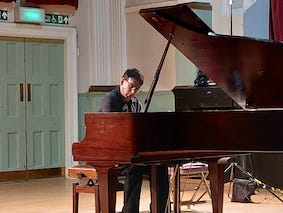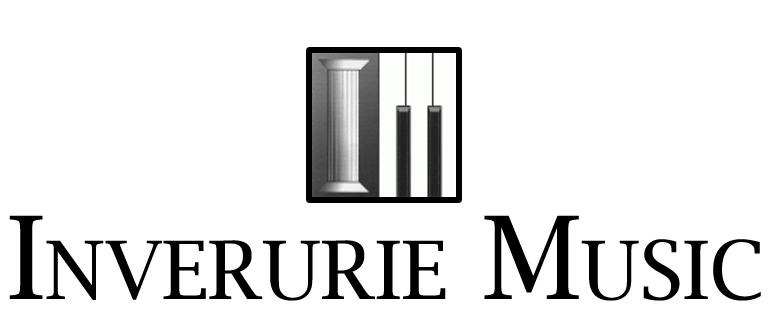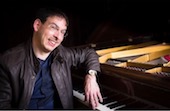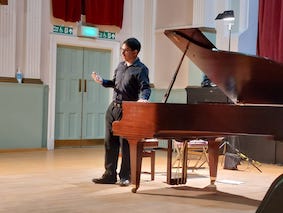When one thinks about Valentine’s Day, one’s thoughts don’t immediately stray to the piano, and if they did, it would probably be to some softly pedalled background music for a romantic dinner or tentative first drink for a prospective couple. However, Valentine’s Day was the date for a very different appreciation of the piano and all it can achieve, presented for an ardent audience at Inverurie Town Hall by pianist Duncan Honeybourne. Love may have been in the air, but it was one of many emotions jostling for attention in this exciting recital which featured equal amounts of passion, tragedy, melancholy and…national anthems. More of that later.

In many ways it was something of a Valentine’s Day miracle that this concert took place, it should have been the Orfeo Trio performing works by Debussy, Faure and Ravel but due to illness this was cancelled. However, Honeybourne was on a mini-tour of Scotland at that very time and was able to fit in concerts in Aberdeen, Inverurie and Cromarty, much to the delight of the concert-going public of the Garioch.
The concert began with Schubert’s late Drei Klavierstücke, written in the final year of his life and published some forty years later with the editorial hand of one Johannes Brahms. The title of the piece doesn’t quite give the full picture of these weighty, quixotic pieces, which in another world could easily have been fashioned into a late sonata. The first piece is dark and turbulent, shifting keys in an uneasy fashion before giving way to a more luminous slow section. The second piece has a main section in the style of a barcarolle, and two episodes in the minor, the second of which brings with it a change of metre, though not of pulse. A similar rhythmical change is invoked at the centre of the last piece, which again offers a strong contrast between agitation and serenity. All three were performed with poise and vigour by Honeybourne.
The second offering in the concert was much less well-known than the first, Tides by English composer William Baines who, like Schubert, died tragically young in 1922. Honeybourne has spent much of the last year recording and promoting the work of Baines, and he spoke authoritatively about this composer who produced so much in his short life and is only now being rescued from obscurity. The two pieces that made up this diptych were wonderfully evocative and original, a beguiling mix of Debussy, Scriabin and Delius delivered with virtuosic panache. This was followed by music that has also faded in popularity since the composer’s death, Scenes in the Scottish Highlands by Alexander Mackenzie, once a composer on a par with Elgar and Stanford whose place in the pantheon of British composers is much less secure than his illustrious contemporaries. A proud Scot who spent much of this life in London (he was the Principal of the Royal Academy of Music for many years), these charming, if fey piano pieces had a faint whiff of traditional music amidst the streams of Brahmsian chords and Schubertian refrains.

The second half of the concert began with a world premiere by the author, National Anthems, four transfigurations of national anthems that were written for Honeybourne last year. I’ve been in a privileged position in the past twelve months having a sabbatical to write nearly 90 minutes of music for the pianist, much of which he is premiering on this Scottish tour having recorded the music late last year for release. It would be wrong of me to delve too deeply into this music, needless to say, it was a beautiful performance that was well received by the audience.
The concert finished with one of the pillars of the piano repertoire, Brahms’s Piano Sonata No.3 from 1853. This vigorous and muscular work has bewitched pianists for over 150 years and Honeybourne pushed the recently restored Town Hall piano to its limits in this powerful performance. A rapturous response from the audience was greeted by a short encore of Liszt’s transcription of Schumann’s beautiful love letter to his wife, Widmung, a passionate and appropriate encore for this Valentine’s Day recital.
©Phillip A Cooke






Comments: no replies